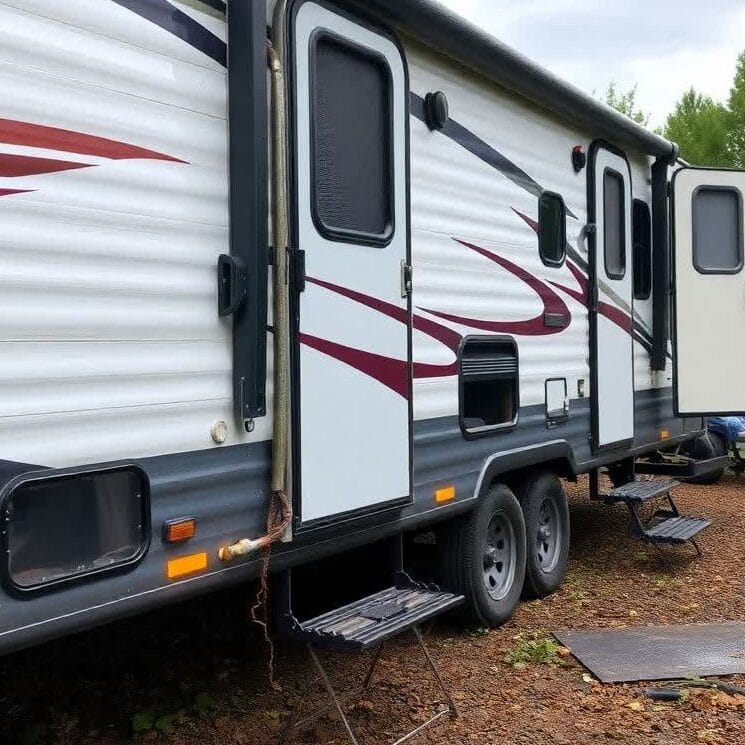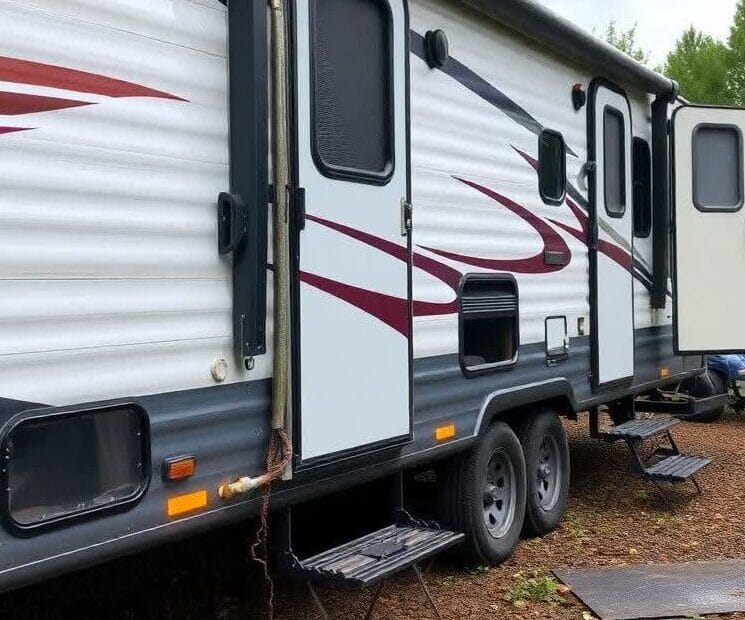Does Insurance Cover Water Damage on a Travel Trailer?
You’ve just arrived at your favorite lakeside campground. The sun is setting, the air smells like pine, and you’re ready to unwind in your travel trailer—your home on wheels. But when you open the door, something feels off. A musty smell. A soft spot on the floor. Then you see it: water damage.
A leak from the roof, a burst pipe, or a backed-up plumbing system has turned your mobile sanctuary into a moisture nightmare. Now you’re staring at thousands in repair costs—and one urgent question:
👉 Does insurance cover water damage on a travel trailer?
The short answer: Yes—but only if you have the right policy and the damage happened under covered circumstances.
In this Ultimate 7-Fact Guide, we’ll break down everything you need to know about travel trailer insurance and water damage. Whether you’re a weekend warrior or a full-time RVer, this guide will help you avoid costly surprises and make smarter insurance decisions.
Let’s dive in.
Why Water Damage Is a Top Threat to Travel Trailers
Water damage isn’t just about a dripping faucet. It can come from many sources—and escalate fast.
Common causes include:
- Roof seal leaks
- Cracked plumbing lines
- Poorly sealed windows or vents
- Condensation buildup
- Flooding during storms
- Frozen and burst pipes in winter
Unlike a house, a travel trailer has limited space, thin walls, and sensitive materials. A small leak can quickly lead to mold, structural rot, ruined insulation, and even electrical hazards.
And here’s the kicker: most standard homeowners or renters insurance policies DO NOT cover water damage to travel trailers.
You need specialized insurance—and understanding your coverage is critical.
Fact #1: Yes, Insurance Can Cover Water Damage—But With Conditions
The good news? Yes, insurance can cover water damage on a travel trailer—but only if:
- You have comprehensive RV or travel trailer insurance
- The damage was sudden and accidental
- It’s not due to neglect, wear and tear, or lack of maintenance
For example: ✅ Covered: A sudden storm causes a tree branch to puncture your roof, leading to water intrusion.
❌ Not Covered: You ignored a known roof seal crack for months, and now the floor is rotted.
Insurance companies look at intent and prevention. If they determine the damage was preventable, your claim could be denied.
What Types of Insurance Cover Water Damage?
Not all policies are created equal. Here are the main types of insurance that might cover water damage—and which ones won’t.
1. RV Insurance (Comprehensive Coverage)
This is your best bet.
Most comprehensive RV insurance policies include coverage for:
- Sudden water damage from storms, accidents, or plumbing failures
- Repair or replacement of damaged interiors
- Mold remediation (in some cases)
Look for policies labeled “full coverage” or “comprehensive plus.”
Pro Tip: Some insurers offer “full-timer” packages for those living in their trailers year-round—these often include expanded water damage protection.

2. Travel Trailer-Specific Insurance
Unlike motorhomes, travel trailers are towed. But they still need dedicated insurance.
Providers like National General, Good Sam, and Hagerty offer policies tailored to towable trailers. These typically cover:
- Sudden water damage from covered perils
- Towing and storage costs during repairs
- Personal property inside the trailer
Make sure “water damage from plumbing or weather” is explicitly listed in the policy.
3. Homeowners Insurance (Spoiler: It Won’t Help)
Many people assume their homeowners policy covers their trailer. It doesn’t.
Homeowners insurance only covers structures on your property—and even then, only detached structures like sheds have limited coverage.
Your travel trailer is considered a vehicle, not a dwelling.
4. Auto Insurance (Also a No-Go)
Your car insurance covers liability and collision for the towing vehicle—not the trailer.
Unless you added a trailer endorsement, your auto policy won’t cover water damage inside the trailer.
Fact #2: Sudden vs. Gradual Damage – The Insurance Game-Changer
Insurance companies draw a sharp line between:
- Sudden and accidental damage → Covered
- Gradual damage (wear and tear, maintenance issues) → Not covered
Let’s break it down.
| Scenario | Covered? | Why? |
|---|---|---|
| Pipe bursts during winter camping | ✅ Yes | Sudden, unexpected |
| Roof leak during a hurricane | ✅ Yes | Covered peril |
| Slow drip from sink for 6 months | ❌ No | Preventable, maintenance issue |
| Mold from poor ventilation | ❌ No | Neglect |
Real-Life Case:
Sarah from Colorado filed a claim after discovering mold in her trailer walls. She’d noticed a small leak last summer but didn’t fix it. The insurer denied the claim, citing “failure to maintain.” She paid $3,200 out of pocket.
Lesson: Report and repair issues immediately—even small ones.
Fact #3: You Need “Comprehensive Coverage” – Not Just Liability
When buying travel trailer insurance, you’ll see several coverage options:
| Coverage Type | Covers Water Damage? |
|---|---|
| Liability Only | ❌ No |
| Collision | ❌ No (covers accidents) |
| Comprehensive | ✅ Yes (covers water, storms, theft) |
| Uninsured Motorist | ❌ No |
Comprehensive coverage is essential for water damage protection. It covers non-collision events like:
- Storms
- Fire
- Theft
- Vandalism
- Sudden water damage
Without it, you’re on the hook for repairs.
👉 Internal Link: Learn how to compare RV insurance policies at TravelHubGuard
Fact #4: Mold and Secondary Damage – A Gray Area
Water damage often leads to mold, rot, and electrical issues. But does insurance cover these?
It depends.
Most comprehensive policies will cover:
- Mold removal if it results from a covered water event (e.g., a burst pipe)
- Replacement of damaged cabinets, flooring, or insulation
But they won’t cover:
- Mold from long-term humidity or poor ventilation
- Damage from DIY repairs gone wrong
Pro Tip: Document everything. Take photos before and after repairs. Keep receipts. Insurers often require proof of sudden cause.
Fact #5: Winterization Failures Are a Common Claim Killer
One of the top reasons water damage claims get denied? Improper winterization.
If you live in a cold climate, you must winterize your trailer before freezing temps hit.
This includes:
- Draining all water lines
- Adding RV antifreeze
- Insulating exposed pipes
If a pipe bursts because you didn’t winterize, insurers will likely deny the claim—calling it “preventable damage.”
Smart Move:
Get a winterization certificate from an RV pro. It proves you took preventive steps—this can help your claim if disaster strikes.
Fact #6: Not All Insurance Providers Are Equal
Just because a company sells RV insurance doesn’t mean they cover water damage well.
Here are the top 3 providers we recommend for strong water damage protection:
1. Good Sam Insurance Agency
Best for: Full-time RVers and travel trailer owners
- Covers sudden water damage from storms, plumbing, and accidents
- Offers “full-timer” policies with expanded coverage
- 24/7 claims support
✅ Why We Like It: Good Sam specializes in RVs and understands trailer-specific risks.
External Link (DoFollow): Good Sam Insurance – Official Site
2. National General RV Insurance
Best for: Towed trailers and seasonal users
- Comprehensive coverage includes water damage
- Rental reimbursement during repairs
- Emergency expense coverage
✅ Why It’s Great: One of the largest RV insurers with strong customer reviews.
3. Hagerty Drivers Club
Best for: Classic and high-value trailers
- Covers vintage Airstreams, Shastas, and custom builds
- Agreed value policies (no depreciation)
- Water damage from covered perils included
✅ Why It Works: Perfect if you own a collector trailer worth protecting.
👉 Internal Link: Compare top RV insurance providers at TravelHubGuard
Fact #7: You Can Prevent Most Water Damage (Here’s How)
Insurance is a safety net—but prevention is cheaper.
Follow these 7 steps to protect your trailer from water damage:
- Inspect the Roof Monthly
Check seals, vents, and AC units for cracks. Re-seal annually with RV-specific caulk. - Clean Gutters and Vents
Debris can trap water and cause pooling. - Use a Moisture Meter
Detect hidden dampness before it becomes mold. - Install a Leak Detection System
Devices like FloodStop or RV Water Watchdog alert you to leaks in real time. - Ventilate Daily
Run fans or open windows to reduce condensation. - Winterize on Time
Don’t wait for the first freeze. Do it when temps drop below 40°F (4°C). - Store Properly
Keep your trailer on level ground with wheel covers and a breathable cover.
What’s NOT Covered? (Avoid These 5 Surprises)
Even the best policies have exclusions. Common ones include:
- Wear and Tear
Cracked hoses, faded seals, or old plumbing aren’t covered. - Lack of Maintenance
If you didn’t clean tanks or inspect seals, claims may be denied. - Sewer Backup Without Sewer Guard
Standard policies don’t cover sewage overflow—unless you add a rider. - Flood Damage (Sometimes)
If you’re parked in a flood zone, you may need separate flood insurance. - DIY Repairs Gone Wrong
Improper fixes that lead to leaks? Not covered.
Always read the exclusions section of your policy.
How to File a Water Damage Claim (Step-by-Step)
If you suffer water damage, act fast:
- Stop the Leak (if safe)
Turn off water, drain lines, remove standing water. - Document Everything
Take photos and videos of the damage from all angles. - Contact Your Insurer
Call within 24–48 hours. Most policies require prompt reporting. - Submit Documentation
Provide:- Photos
- Repair estimates
- Maintenance records
- Police or weather reports (if applicable)
- Work with an Adjuster
They’ll inspect the damage and determine coverage. - Get Repairs Done
Use approved RV repair shops for faster reimbursement.
How Much Does RV Insurance Cost?
On average, RV insurance for a travel trailer costs $200–$500 per year, depending on:
- Trailer value ($15,000 vs. $50,000)
- Coverage level (liability vs. comprehensive)
- Usage (weekend trips vs. full-time living)
- Location (flood zones cost more)
💡 Money-Saving Tip: Bundling with auto or home insurance can save 10–15%.
Frequently Asked Questions (FAQ)
Does insurance cover water damage on a travel trailer?
Yes, if you have comprehensive RV or travel trailer insurance and the damage was sudden and accidental—not due to neglect or wear and tear.
Will RV insurance cover a leaking roof?
Only if the leak was caused by a covered event (like a storm or impact). Gradual wear or poor maintenance is not covered.
What should I do if my travel trailer gets water damage?
Stop the leak, document the damage, contact your insurer within 48 hours, and keep all receipts.
Does Good Sam cover water damage?
Yes, Good Sam’s comprehensive policies cover sudden water damage from storms, plumbing failures, and accidents.
Can I add mold coverage to my RV insurance?
Some insurers offer mold remediation as part of comprehensive coverage—if it results from a covered water event.
Do I need separate flood insurance for my travel trailer?
If you live in a flood-prone area, yes. Standard RV policies often exclude flood damage.
Final Tips to Stay Protected
✅ Buy comprehensive coverage—liability isn’t enough.
✅ Inspect your trailer monthly—catch leaks early.
✅ Winterize on schedule—avoid burst pipes.
✅ Keep maintenance records—they help during claims.
✅ Compare policies—don’t just pick the cheapest.
Ready to Protect Your Travel Trailer?
Water damage can happen to anyone—even careful owners. But with the right insurance, you can turn a disaster into a manageable repair.
Don’t wait until it’s too late.
👉 Compare top-rated RV and travel trailer insurance policies today.
Find the perfect plan with full water damage coverage, 24/7 support, and peace of mind on the road.

Pingback: RV Insurance Claim for Water Damage: The Ultimate 5-Step Guide to Getting Paid Fast - Travel Hub Guard